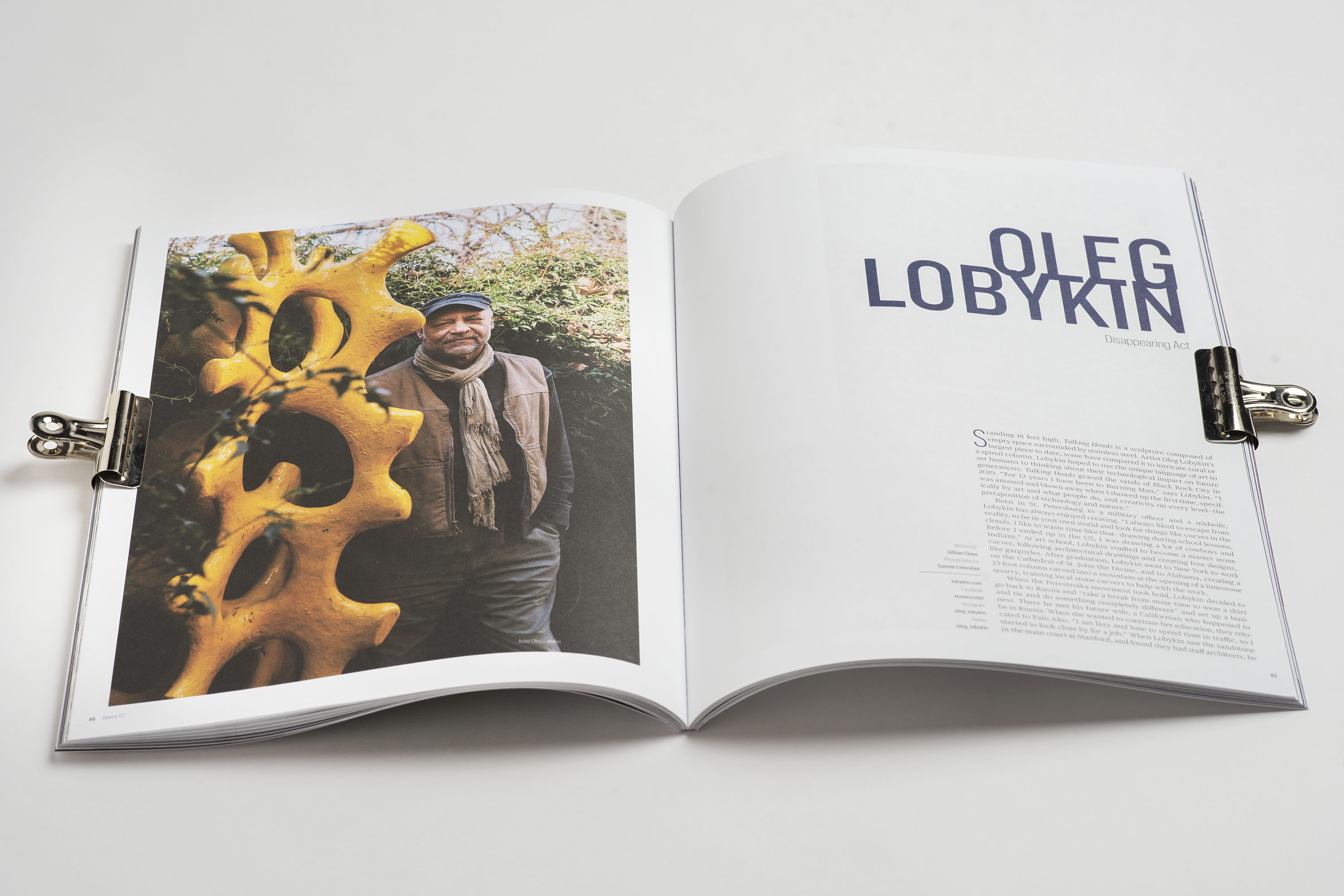
S tanding 18 feet high, Talking Heads is a sculpture composed of empty space surrounded by stainless steel. Artist Oleg Lobykin’s largest piece to date, some have compared it to intricate coral or a spinal column. Lobykin hoped to use the unique language of art to set humans to thinking about their technological impact on future generations. Talking Heads graced the sands of Black Rock City in 2019. “For 12 years I have been to Burning Man,” says Lobykin. “I was amazed and blown away when I showed up the first time, specifically by art and what people do, and creativity on every level—the juxtaposition of technology and nature.”
Born in St. Petersburg to a military officer and a midwife, Lobykin has always enjoyed creating. “I always liked to escape from reality, to be in your own world and look for things like curves in the clouds. I like to waste time like that—drawing during school lessons. Before I ended up in the US, I was drawing a lot of cowboys and Indians.” At art school, Lobykin studied to become a master stone carver, following architectural drawings and creating free designs, like gargoyles. After graduation, Lobykin went to New York to work on the Cathedral of St. John the Divine, and to Alabama, creating a 23-foot column carved into a mountain at the opening of a limestone quarry, training local stone carvers to help with the work.
When the Perestroika movement took hold, Lobykin decided to go back to Russia and “take a break from stone time to wear a shirt and tie and do something completely different” and set up a business. There he met his future wife, a Californian who happened to be in Russia. When she wanted to continue her education, they relocated to Palo Alto. “I am lazy and hate to spend time in traffic, so I started to look close by for a job.” When Lobykin saw the sandstone in the main court at Stanford, and found they had staff architects, he showed them his portfolio and was hired. Stonesculpt, his masonry restoration company, is still working for Stanford 20 years later—as well as for the Presidio and the City of San Jose.
Lobykin has a studio in East Palo Alto where he lives with his wife and daughter and continues to express himself in his art, selling some pieces and showing in a handful of galleries. He created No Swimming for Burning Man in 2008. Over the next few years, the piece went to Google HQ and then to Newport Beach. Now, Playa to Paseo, the Burning Man Project, and the City of San Jose collaboration has brought the 12-foot sculpture to SAP Center. “Its original meaning was about danger, fear, and hope for tomorrow; that is why it is a shark fin,” says Lobykin. “But at SAP, it is all about sharks, or whatever people see.”
Searching for the basic elements required to create complex form, Lobykin is experimenting with reflections and form in a massive conceptual piece called Pixel. “I actually look at forms in a different way,” says Lobykin. “How does it start? Where does it meet the form itself? In music you have notes. If you are talking about visual arts, specifically a three-dimensional object, what is the ABC over there?” Lobykin imagines Pixel’s polished curve as an interactive sculpture, more than 30 feet tall, that would allow the viewer to see themselves reflected in the surface. “If you come close to it, you appear in a normal way. If you go far away, you disappear and become part of your surroundings.”
Such process requires a combination of technology and natural material. Computer renderings don’t give the full picture. His process can involve 3D printing, traditional bronze foundries, and chromium-plated bronze. But he can equally explore found objects, like beach stones, turning them over in his hands before knowing what his stone will become. “I just take the stone, look at it. What can be done with this? I wanted to see how you could balance something made by nature—keep the natural shape but at the same time work with man’s interference.”
lobykin.com
Facebook: stonesculpt
Instagram: oleg_lobykin
Article originally appeared in Issue 12.1 “Discover”
SOLD OUT


